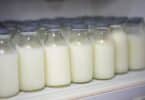A recent study led by the University of Iowa revealed that extremely premature infants fed donated breast milk had a significantly lower rate of life-threatening diseases compared to those fed formula. The findings also showed that babies born before 29 weeks who received donor milk had similar neurological development outcomes as those fed formula.
Extremely preterm infants are at high risk for neurodevelopmental issues and necrotizing enterocolitis, a potentially fatal condition. While it has been known that mother’s milk is best for these infants, the study explored the outcomes of donated breast milk versus formula feeding.
Lead researcher Tarah Colaizy emphasized that there was no developmental disadvantage with the use of donor milk, making it a valuable option for mothers who cannot provide their own milk in sufficient quantities. The study also highlighted the decreased risk of necrotizing enterocolitis when using donor milk over preterm formula.
These findings could lead to updated recommendations on donor milk, which has been underutilized in hospitals until recently. By conducting a large-scale clinical trial involving 483 preterm infants from across the U.S., researchers aimed to provide conclusive evidence supporting the benefits of donor milk for very low birth weight babies.
The research supports the current American Academy of Pediatrics’ endorsement of pasteurized and nutrient-fortified donor milk for preterm infants. Colaizy’s team hopes these results will encourage more NICUs to utilize donor milk to improve outcomes for vulnerable newborns.
If you are considering giving your premature baby human milk from a donor the FDA suggests talking to a healthcare provider first. If you go ahead, ensure the milk comes from a trusted source that screens its donors and takes safety precautions.
Some human milk banks go the extra mile to screen donors and handle milk safely. In some states, there are specific safety standards for these banks. FDA has not been involved in establishing these voluntary guidelines or state standards.
This study, published in the Journal of the American Medical Association, sheds light on the importance of donor milk in improving health outcomes for extremely premature infants.
Related Articles:







